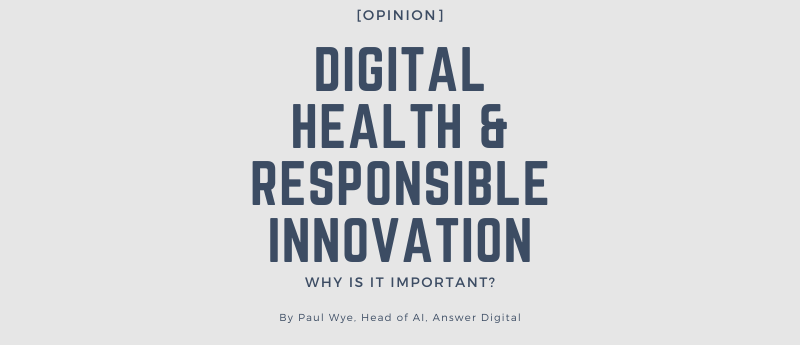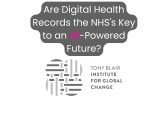Innovation in Digital Health: Why is it so Important to Act Responsibly?

The Labour Government’s vision for growth is aligned to the success of one of the fastest growing ecosystems in the UK: technology. But what does this mean for the health sector, and why is it so important to ensure that we innovate responsibly?
Sir Keir Starmer wants the tech industry to thrive and become more profitable. With AI technologies alone projected to boost UK GDP by up to 10.3% by 2030, the Prime Minister wants businesses to focus on responsible innovation, particularly in public services.
However, the NHS and other public services are under increasing pressure from rising demand, an ageing population, and financial constraints. It is well documented that the NHS has been starved of capital and the result is crumbling infrastructure that is hindering productivity. The backlog maintenance bill now stands at more than £11.6bn and a lack of capital means that there are too many outdated systems, too little automation, and that some parts of the NHS are still to enter the digital era.
Bring these elements together and this is where progress through responsible innovation is essential to drive forward the health service in line with the upcoming 10 Year Health Plan. Yet, economic growth driven by digital health will be meaningless if it exacerbates existing inequalities, does not consider equity of access, or leaves vulnerable populations behind. Rural areas, low-income communities, and the elderly must not be overlooked in the rush to embrace technology.
Taking a Responsible Approach
A great example of responsible innovation is the recent opening of the community diagnostic centre (CDC) in the north-east’s MetroCentre shopping centre; a joint service between Gateshead Health NHS Foundation Trust and The Newcastle upon Tyne Hospitals NHS Foundation Trust.
It is all too easy to become distracted by the latest solutions available and think that bringing in something new is the only way to tackle capacity problems. However, for Gateshead and Newcastle, their priority was to innovate using technology they already had in order to release diagnostic capacity quickly.
The approach of placing clinical services in a shopping centre with over 550,000 people able to reach it by public transport in under 30 minutes is delivering equity of access and care across the region. Clinicians now understand the diagnostic need at a regional level so supply can be aligned to demand, making further improved use of time and resources.
Responsible innovation is not solely about advancing technology, but ensuring that progress is equitable, inclusive, and sustainable for all. While digital technologies present a powerful tool to help address pressures in the health service, their implementation must be done thoughtfully and digital solutions should be designed with the NHS values at the core.
Unfortunately, responsible practice and innovation in healthcare don’t always go hand in hand. Using AI as an example; the advancement in capability has created much anticipation and excitement in healthcare, but also a heightened sense of opportunity among technology providers. Unfortunately, much of the national funding made available to date has encouraged lots of individual siloed development projects, rather than evaluating the benefits of AI at scale.
Broader Ecosystem
Sustainable economic growth in healthcare requires careful attention to the broader ecosystem in which these technologies are deployed. Data security, privacy, and ethical considerations should be central to innovation, ensuring that the economic benefits of digital health are not outweighed by risks such as data misuse or inequality in access.
As highlighted in the recent report by Prof. Cathie Sudlow, ‘Uniting the UK’s Health Data: A Huge Opportunity for Society’, aligning these goals with the government’s agenda for long-term sustainable growth requires collaboration between tech companies, healthcare providers, and policymakers to establish robust regulations and frameworks that protect both individuals and institutions.
A great example is the increasing use of federation in the Secure Data Environments programme. While the rich datasets held in NHS systems are a huge and largely untapped source of value for health research, failed projects show that patients and the public are uncomfortable with large health record datasets being built and held centrally. By joining health records from hospitals and GPs across individual regions and providing Trusted Research Environments to researchers, data analysis can be done under locally-defined privacy and security controls without having to hand over records to third party organisations.
Answer Digital’s work with several regional SDEs has focused on aligning their datasets with common data standards and structures, allowing researchers to run the same analysis across environments so that they can still gain access and consistent results across a large patient population while under regional controls. Access to a broad base of patient data is particularly important, for example when researching rare disease or training AI in a way that avoids bias.
Aligning with NHS values
On a business and employer level, responsible innovation is central to everything we do at Answer Digital. Championing diversity and ensuring that every member of our team feels valued, respected, and heard, working for the benefit of the community, and aligning our values to those of the NHS. As an employee-owned digital consultancy this is an approach that we take seriously, embodied through our Answer Academy. We currently have approximately 120 people working in the team, and over half of these have joined through our academy which has given more people the opportunity to work in tech, no matter where they started their career.
The best outcomes in healthcare often come from a combination of human empathy and technological innovation. As digital health solutions continue to evolve, it is essential that all stakeholders—government, healthcare providers and tech companies work together to ensure that progress is both responsible and sustainable.
Following the industrial strategy consultation in late 2024, I look forward to seeing if Labour’s desire for responsible innovation is followed by the subsequent action when the Invest 2035 industrial strategy and the highly anticipated 10 Year Health Plan are both published in spring.




